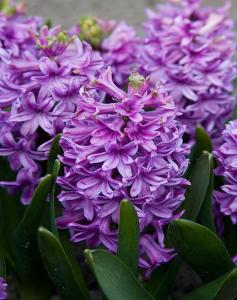
Οἴαν τὰν ὐάκινθον ἐν ὤρεσι ποίμενες ἄνδρες
πόσσι καταστείβοισι, χάμαι δέ τε πόρφυρον ἄνθος . . .
like the hyacinth in the mountains that shepherd men
with their feet trample down on the ground the purple flower
(tr. Katherine Wasdin)

Οἴαν τὰν ὐάκινθον ἐν ὤρεσι ποίμενες ἄνδρες
πόσσι καταστείβοισι, χάμαι δέ τε πόρφυρον ἄνθος . . .
like the hyacinth in the mountains that shepherd men
with their feet trample down on the ground the purple flower
(tr. Katherine Wasdin)

Οἶον τὸ γλυκύμαλον ἐρεύθεται ἄκρῳ ἐπ’ ὔσδῳ,
ἄκρον ἐπ’ ἀκροτάτῳ, λελάθοντο δὲ μαλοδρόπηες·
οὐ μὰν ἐκλελάθοντ’, ἀλλ’ οὐκ ἐδύναντ’ ἐπίκεσθαι
(Sappho, fr. 105a)
As the sweet-apple reddens on the bough-top, on the top of the topmost bough; the apple-gatherers have forgotten it—no they have not forgotten it entirely, but they could not reach it. (tr. David Campbell)

Oἰ μὲν ἰππήων στρότον, οἰ δὲ πέσδων,
οἰ δὲ νάων φαῖσ’ ἐπὶ γᾶν μέλαιναν
ἔμμεναι κάλλιστον, ἔγω δὲ κῆν’ ὄτ-
τω τις ἔραται·
πάγχυ δ’ εὔμαρες σύνετον πόησαι
πάντι τοῦτ’, ἀ γὰρ πόλυ περσκέθοισα
κάλλος ἀνθρώπων Ἐλένα τὸν ἄνδρα
τὸν πανάριστον
καλλίποισ’ ἔβα ‘ς Τροΐαν πλέοισα
κωὐδὲ παῖδος οὐδὲ φίλων τοκήων
πάμπαν ἐμνάσθη, ἀλλὰ παράγαγ’ αὔταν
. . . . ]σαν
Κύπρις· εὔκαμπτον γὰρ [. . .
. . . κούφως τρέπεται νόησιν
κἄμε νῦν Ἀνακτορίας ὀνέμναι-
σ’ οὐ παρεοίσας,
τᾶς κε βολλοίμαν ἔρατόν τε βᾶμα
κἀμάρυχμα λάμπρον ἴδην προσώπω
ἢ τὰ Λύδων ἄρματα καὶ πανόπλοις
πεσδομάχεντας.
(Sappho, fr. 16.1-20 Campbell)
Some might call a cavalry troop the best thing
seen on dark earth, others would name the foot troops,
others still the navy, but I will say it’s
what you desire most.This is very easy to demonstrate to
all and sundry: Helen, above all humans
judged to be the fairest, abandoned a most
powerful spouse andsailed to Troy and neither for child nor parents
(though they loved her) worried the slightest bit, for
she was driven on by the mighty goddess
firing her passion.Heart and will are molded by Aphrodite:
nimbly did she turn Helen’s mind. She brings me
thoughts of Anaktoria now, a girl who’s
gone from among us.I would rather gaze at her lovely walk and
watch the play of light on her shining face than
see those horse-drawn Lydian cars and foot troops
battling in armor.(tr. William Berg)

] Σαρδ ̣[ ̣ ̣]
πόλ]λακι τυίδε̣ [ν]ων ἔχοισα
ὠσπ ̣[ ̣ ̣ ̣] ̣ ώομεν, ̣[ ̣ ̣ ̣] ̣ ̣χ[ ̣ ̣]-
σε θέαι σ’ ἰκέλαν ἀρι-
γνώται, σᾶι δὲ μάλιστ’ ἔχαιρε μόλπαι̣·
νῦν δὲ Λύδαισιν ἐμπρέπεται γυναί-
κεσσιν ὤς ποτ’ ἀελίω
δύντος ἀ βροδοδάκτυλος σελάννα
πάντα περρέχοισ’ ἄστρα· φάος δ’ ἐπί-
σχει θάλασσαν ἐπ’ ἀλμύραν
ἴσως καὶ πολυανθέμοις ἀρούραις·
ἀ δ’ ἐέρσα κάλα κέχυται, τεθά-
λαισι δὲ βρόδα κἄπαλ’ ἄν-
θρυσκα καὶ μελίλωτος ἀνθεμώδης.
πόλλα δὲ ζαφοίταισ’, ἀγάνας ἐπι-
μνάσθεισ’ Ἄτθιδος ἰμέρῳ
λέπταν ποι φρένα κ[ᾶ]ρ[ι σᾶι] βόρηται·
(Sappho fr. 96.1-17)
. . . Sardis . . . often turning her thoughts in this direction . . . (she honoured) you as being like a goddess for all to see and took most delight in your song. Now she stands out among Lydian women like the rosy-fingered moon after sunset, surpassing all the stars, and its light spreads alike over the salt sea and the flowery fields; the dew is shed in beauty, and roses bloom and tender chervil and flowerly melilot. Often as she goes to and fro she remembers gentle Atthis and doubtless her tender heart is consumed because of your fate. (tr. David A. Campbell)

Ἔσπερε πάντα φέρων ὄσα φαίνολις ἐσκέδασ’ αὔως
†φέρεις ὄϊν, φέρεις† αἶγα, φέρεις ἄπυ μάτερι παῖδα.
(Sappho, fr. 104 Campbell)
Hesperus, bringing everything that shining Dawn scattered, you bring the sheep, you bring the goat, you bring back the child to its mother.
(tr. Gillian Spraggs)
Κατθάνοισα δὲ κείσῃ οὐδέ ποτα μναμοσύνα σέθεν
ἔσσετ’ οὐδέ πόθα’ εἰς ὔστερον· οὐ γὰρ πεδέχῃς βρόδων
τὼν ἐκ Πιερίας, ἀλλ’ ἀφάνης κἀν Ἀΐδα δόμῳ
φοιτάσῃς πεδ’ ἀμαύρων νεκύων ἐκπεποταμένα.
(Sappho, fr. 55 Campbell)
But when you die you will lie there, and afterwards there will never be any recollection of you or any longing for you since you have no share in the roses of Pieria*; unseen in the house of Hades also, flown from our midst, you will go to and fro among the shadowy corpses. (tr. David A. Campbell)